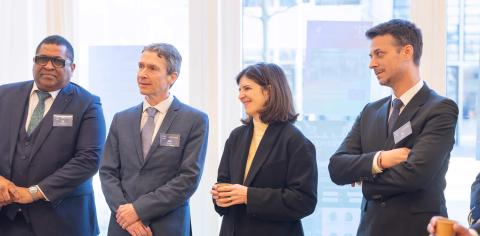
Université Paris-Saclay inaugurates the DataIA-Cluster
Coordinated by DataIA, Université Paris-Saclay’s Institute for Artificial Intelligence, the DataIA-Cluster is one of nine AI clusters to be labelled as part of the France 2030 national investment plan. It was officially inaugurated on Monday 7 April 2025 by Clara Chappaz, minister delegate for Artificial Intelligence and Digital Technologies, Camille Galap, president of Université Paris-Saclay and Frédéric Pascal, director of DataIA.
The DataIA Institute is the official institute for Artificial Intelligence (AI) at Université Paris-Saclay. Created in 2017 as part of the "Instituts Convergences" call for projects launched by the French National Research Agency (ANR), the institute brings together over 800 researchers from 47 laboratories to promote cutting-edge interdisciplinary research in AI and data science, linked to humanities and social sciences.
Since 2021, the institute has focused on the university’s strategic AI development, by boosting research, integrating AI modules into its course and innovation offer and by strengthening collaborations between academic and industry stakeholders. It supports innovative research projects, encourages national and international mobilities and organises regular scientific events aimed at bringing the Paris-Saclay AI community together.
In addition to the role it plays in research and innovation, DataIA also contributes to the training of AIrelated professions through the SaclAI-School project. Since 2022, the project has covered a vast range of degree levels, from undergraduate programmes to doctoral students in universities, Master’s programmes in grandes écoles, full-time academic and life-long learning programmes, whilst facilitating access to higher education with grants and tutoring platforms.
In May 2024, DataIA was one of nine winning projects to be awarded the “AI-Cluster” label by the French government, which celebrates centres of research and education excellence in artificial intelligence. The label was created as part of a drive to support the emergence of world-class clusters in artificial intelligence and the training of future talents who can meet AI needs – outlined as one of the priorities of the national France 2030 investment plan.
The DataIA Cluster brings together 14 higher education institutions and research organisations, an external continuing education company (CentraleSupélec Exed), the Jacques Hadamard Mathematics Foundation (FMJH), and the Gustave Roussy Centre.
The cluster aims to meet four key objectives:
- Establish France as a world leader in AI, by creating an internationally renowned interdisciplinary cluster which tackles economic and societal challenges, particularly in ethics, ecology and sovereignty.
- Encourage societal transformation using AI by considerably increasing the number of students trained in AI.
- Create an effective continuum between research, innovation and education.
- Ensure the adaptability of the DataIA-Cluster to rapid AI developments and impacts.
Frédéric Pascal appointed Vice-President for Artificial Intelligence
Frédéric Pascal is a university professor at CentraleSupélec, Université Paris-Saclay, specialised in Applied Mathematics for Artificial Intelligence at the Signals and Systems Laboratory.
Having obtained a PhD from Université Paris-Nanterre in 2006, and an accreditation to supervise research (HDR) in 2012 from Université Paris-Sud, he became a visiting professor at the National University of Singapore. Following his role as head of the Signals and Statistics team at the Signals and Systems Laboratory, he was appointed head of Artificial Intelligence activities at CentraleSupélec and director of the school’s AI Hub in December 2019. In 2021, he became deputy director of the DataIA Institute before becoming its director in 2023. He has co-run the SaclAI-School AI training programme at Université Paris-Saclay since 2022.
In 2023, he was appointed a qualified person of the French High Council for Artistic and Literary Property (CSPLA - Conseil supérieur de la propriété littéraire et artistique) at the Ministry of Culture. Since 2024, he has coordinated scientific cooperation in AI and cybersecurity between France and Taiwan. At the end of 2024, the Ministry for Higher Education and Research charged him with a mission on issues related to AI and education.
Frédéric Pascal also plays an active editorial role in scientific journals and contributes to various technical industrial and academic committees. His research explores statistics, signal and image processing, and automatic learning, and have led to the publication of over 200 articles in journals and top international conferences.
“Conscious of the growing importance of artificial intelligence in our missions as a higher education and research institution, I have decided to appoint a Vice-President for Artificial Intelligence at Université Paris-Saclay. Frédéric Pascal, director of Data-IA and renowned expert, is the obvious choice. As part of this role, he will support the development of AI uses at the university, encourage a training plan for staff, define the university’s strategy in sovereignty, and accompany the deployment of AI in the institution’s activities in regards to ethics,” said Camille Galap, president of Université Paris-Saclay
